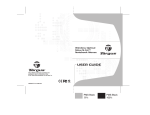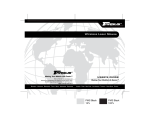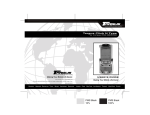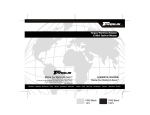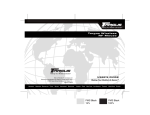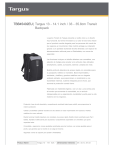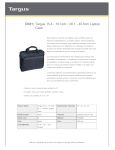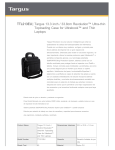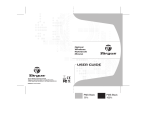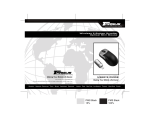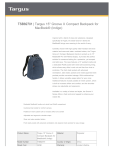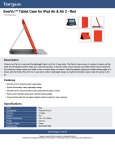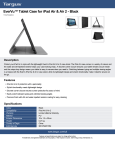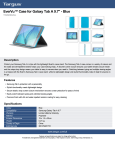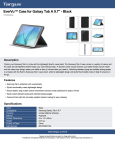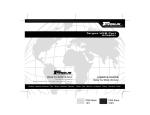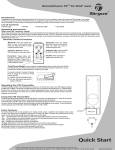Download Targus USB-2.0 Mobile User's Manual
Transcript
USB-2.0 Mobile Mini Hub Making Your Mobile Life Easier. USER’S GUIDE Visit our Web site at: www.targus.com Making Your Mobile Life Easier. Features and specifications are subject to change without notice. © 2002 Targus Corp. 400-0093-001A BRUSSELS HANNOVER BARCELONA TOKYO MILANO AMSTERDAM SINGAPORE LONDON PARIS NEW YORK LOS ANGELES TORONTO HONG KONG SYDNEY USB 2.0 Mobile Mini Hub Introduction Congratulations on your purchase of the Targus Noteworthy USB 2.0 Mobile Mini Hub. This ultra portable mini hub is USB 2.0 compliant and connects to a Universal Serial Bus (USB) port on your desktop or notebook computer. The mini hub has four ports for connecting USB (high-speed 2.0 or standard 1.1) devices to your computer. One or more of these devices can be additional hubs. You can daisy-chain up to 127 USB (high-speed 2.0 or standard 1.1) devices to your computer in this way. The mini hub also provides a maximum bandwidth of 480 Mbps, which enables you to connect devices that consume a large amount of bandwidth, such as an external storage device, printer, scanner, DVD or CD-RW drive or digital camera, to your computer. In addition to this user’s guide, this package contains the USB 2.0 Mobile Mini Hub, a high-speed USB 2.0 cable and an AC power adapter and cord. System Requirements To use the mini hub, your computer must meet the following hardware requirements and run one of the operating systems listed below. Hardware Operating System Windows® 98SE/Me/ Pentium® processor or equivalent 2000/XP and a hard disk drive • 64 MB RAM or higher, depending • Mac OS X and higher on the operating system • USB version 2.0 interface • PC with a 233 MHz or faster Intel® • 2 NOTES: The USB 2.0 Mobile Mini Hub is backward compatible, so you can connect it to a computer with either a version 1.1 or 2.0 USB interface. When using the mini hub with a computer that has a version 1.1 USB interface, all of the devices attached to the mini hub will run at a version 1.1 USB speed. Connecting the Mini Hub to Your Computer and Installing the Default Device Drivers To connect the mini hub to your computer and install the operating system’s default drivers: 1 Plug the supplied high-speed cable’s USB connector end (type A) into a USB port on your computer. 2 Plug the cable’s other connector end (type B) into the mini hub. AC power jack USB port (type B) Mini hub - AC power jack and USB port (type B) 3 Connect the supplied AC power adapter to the AC power jack on the mini hub, then plug the adapter into an available electrical outlet. Your computer’s operating system automatically detects the new hardware and begins installing the appropriate default drivers. 4 Follow the on-screen instructions to complete the driver installation. You can now connect USB devices to the mini hub or daisychain additional hubs. 3 Connecting Devices to the Mini Hub To connect a USB device, plug it into a USB port on the mini hub and follow any additional instructions provided with the device. When connecting new devices to the mini hub, consider the following guidelines: • If your computer is running the Windows® 98 operating system, a series of screens appear, beginning with the Add New Hardware Wizard, to guide you through the driver installation process. • If your computer is running the Windows® Millennium Edition, Windows® 2000 or Windows® XP operating system, the device drivers may install automatically. • When connecting a new device to the mini hub, you must run the Setup or Install program for that device. • When connecting a device to the mini hub, to avoid possible damage, never force the cable connector into the port on the mini hub. If the cable connector does not attach smoothly, remove the connector, turn it over and try attaching it again. 4 LED Status Indicator Lights Once the default drivers are installed, the LED status indicator lights glow and you can connect devices to the mini hub. Mini hub - LED status indicator lights The LED lights display as follows: • Power light glows red when the mini hub is receiving power from an external power source NOTE: Use only the supplied AC power adapter with the mini hub to avoid possible damage. • Each USB light glows blue when a device is connected to the port. Specifications Dimensions 2 inches (diameter) Weight 2.5 ounces (70.9 g) 5 Operating Temperature 32 to 158 degrees Fahrenheit (0 to 70 degree Celsius) Standards USB Specification Revision 2.0 and 1.1 compatibility Data Speed USB v1.1: 12 Mbps USB v2.0: 480 Mbps Connector Ports Hub to computer: 1 (series B receptacle) Hub to devices: 4 (series A receptacle) LED Indicators Power: 1 (Red) Hub to devices: 4 (White/blue) Per-Port Current 500 mA (with the AC power adapter) External Power - AC Power Adapter DC 5 Volt Cable length 6-foot (1.83 m) Troubleshooting General Can I connect USB 1.1 compatible devices to the mini hub? Yes, the mini hub is backward compatible with USB 1.1 devices. 6 Can I use the mini hub without the AC power adapter? No, you must use the supplied AC power adapter to ensure that the devices work properly. Device Not Working • Make sure that the device is firmly connected to the port on the mini hub. • Plug the device into a different port on the mini hub. If it still doesn’t work, test the device by connecting it directly to your computer. • Check that you ran the Setup or Install program for the device. • Make sure that the device appears in Device Manager. See “Verifying Device is Installed” below. • Disconnect all devices from the mini hub and reconnect them, one at a time. Check that each device works before plugging in the next one. Verifying Device is Installed Windows® Operating System To check that the mini hub is installed properly, use Device Manager to locate the Generic USB Hub on USB 2.0 Bus device. To access Device Manager for the Windows® 98/Me operating system, right-click My Computer, Properties, and then click the Device Manager tab. For the Windows® 2000/XP operating system, right-click My Computer, Properties, click the Hardware tab, then click the Device Manager button. 7 To test that the mini hub is working properly, in the Device Manager window: 1 Select the Generic USB Hub on USB 2.0 Bus device. 2 Click the Properties button or icon, depending on your operating system. 3 Verify that the message “This device is working properly” appears. Macintosh Operating System To verify that the mini hub is installed properly, locate the Generic USB Hub on USB 2.0 Bus device by opening Apple System Profiler and clicking Devices and Volumes. USB Hub Current Limit Exceeded Warning If a device exceeds the power available for its hub port, the following screen appears with the offending device highlighted. USB Hub Current Limit Exceeded screen To re-enable the hub port for the affected device, follow the on-screen instructions. 8 Technical Support In the unlikely event that you encounter a problem with your Targus accessory, please contact our technical support team at: Email: [email protected] Internet: http://www.targus.com/support.asp Our knowledgeable staff is also available to answer your questions through one of the following telephone numbers. US Monday through Friday, 8:00 a.m. (08:00) to 8:00 p.m. (20:00) Eastern time: 800-283-6325 Canada Monday through Friday, 9:00 a.m. (09:00) to 5:00 p.m. (17:00) Eastern time: 888-827-4877 Europe Belgium +32 0 02-717-2451 Denmark +45 0 35-25-8751 France Germany +33 0 1-64-53-9151 +49 0 21-16-579-1151 Italy +39 0 24-827-1151 Netherlands +31 0 53-484-9470 Spain Sweden Switzerland United Kingdom Eastern Europe & others +34 0 91-745-6221 +46 0 8-751-4058 +41 0 1-212-0007 +44 0 20-7744-0330 +31 0 53-484-9479 9 Product Registration For more efficient customer service and to activate the product’s warranty, Targus recommends that you register your Targus accessory shortly after purchasing it. To register your Targus accessory, go to: http://www.targus.com/registration.asp You will need to provide your full name, email address, phone number, and company information (if applicable). Warranty Targus warrants this product to be free from defects in materials and workmanship for one year. If your Targus accessory is found to be defective within that time, we will promptly repair or replace it. This warranty does not cover accidental damage, wear and tear, or consequential or incidental loss. Under no conditions is Targus liable for loss of, or damage to a computer; nor loss of, or damage to, programs, records, or data; nor any consequential or incidental damages, even if Targus has been informed of their possibility. This warranty does not affect your statutory rights. Warranty Registration at: http://www.targus.com/registration.asp Regulatory Compliance This device complies with Part 15 of the FCC Rules. Operation is subject to the following two conditions: (1) This device may not cause harmful interference, and (2) This device must accept any interference received, including interference that may cause undesired operation. FCC Statement Tested to Comply This equipment has been tested and found to comply with the limits of a Class B digital device, pursuant to Part 15 of the FCC Rules. These limits are designed to provide reasonable protection against harmful interference in a residential installation. This equipment generates, uses, and can radiate radio frequency energy and if not installed and used in accordance with the instructions, may cause harmful interference to radio communications. However, there is no guarantee that interference will not occur in a particular installation. 10 If this equipment does cause harmful interference to radio or television reception, which can be determined by turning the equipment off and on, the user is encouraged to try to correct the interference by one or more of the following measures: • Reorient or relocate the receiving antenna • Increase the separation between the equipment and receiver • Move the computer away from the receiver • Connect the equipment into an outlet on a circuit different from that to which the receiver is connected. Intel and Pentium are registered trademarks of Intel Corporation. Windows is a registered trademark of Microsoft Corporation. Macintosh is a registered trademark of Apple Computer, Inc. All other trademarks are the property of their respective owners. 11











